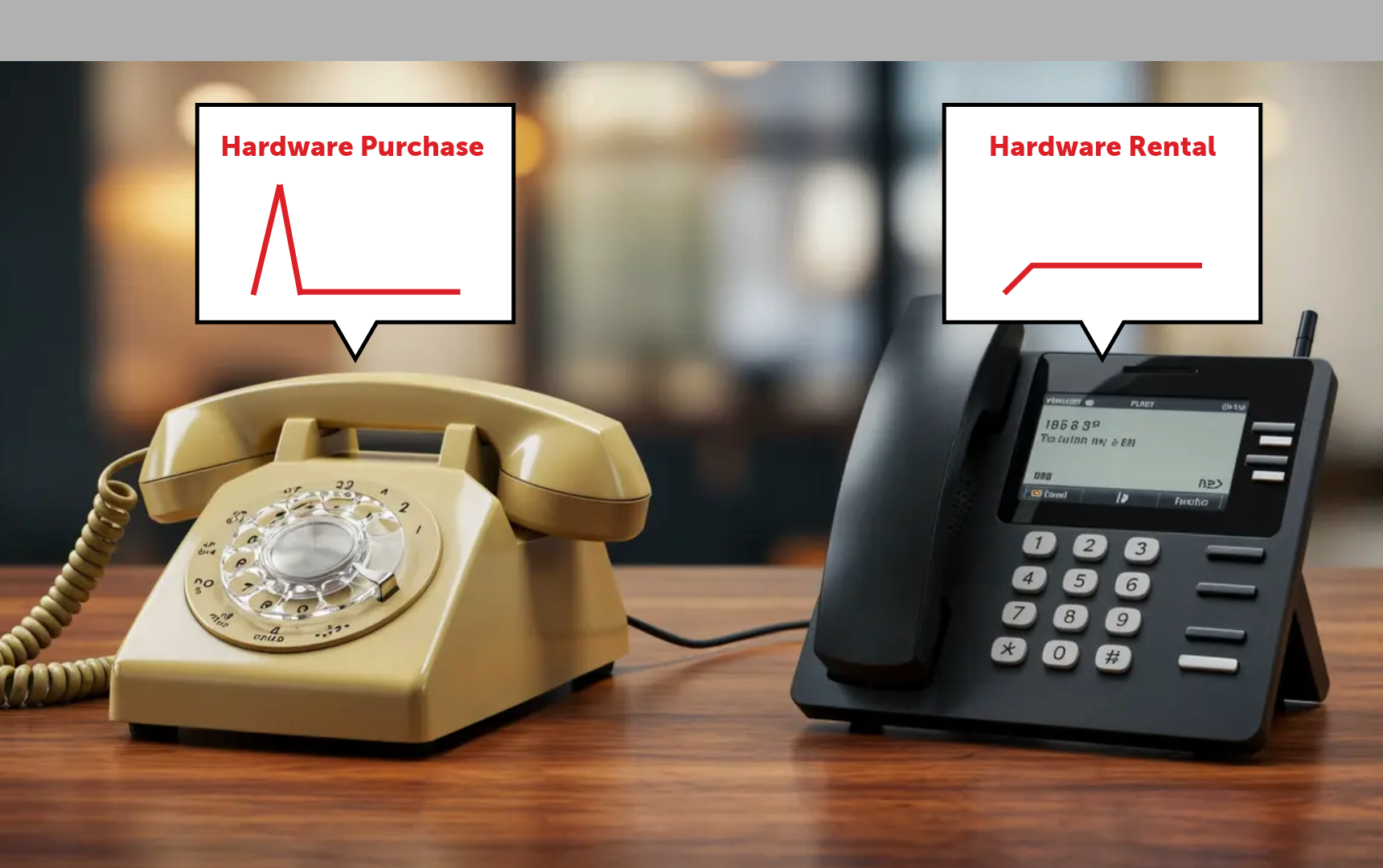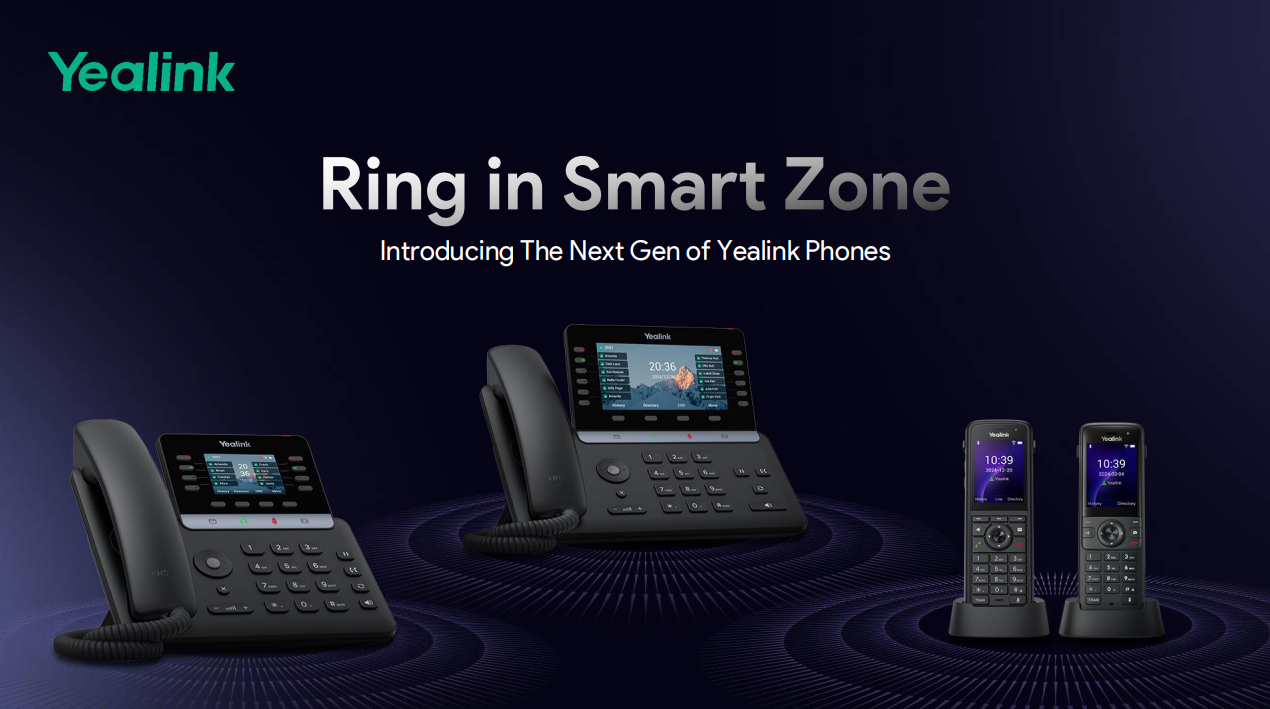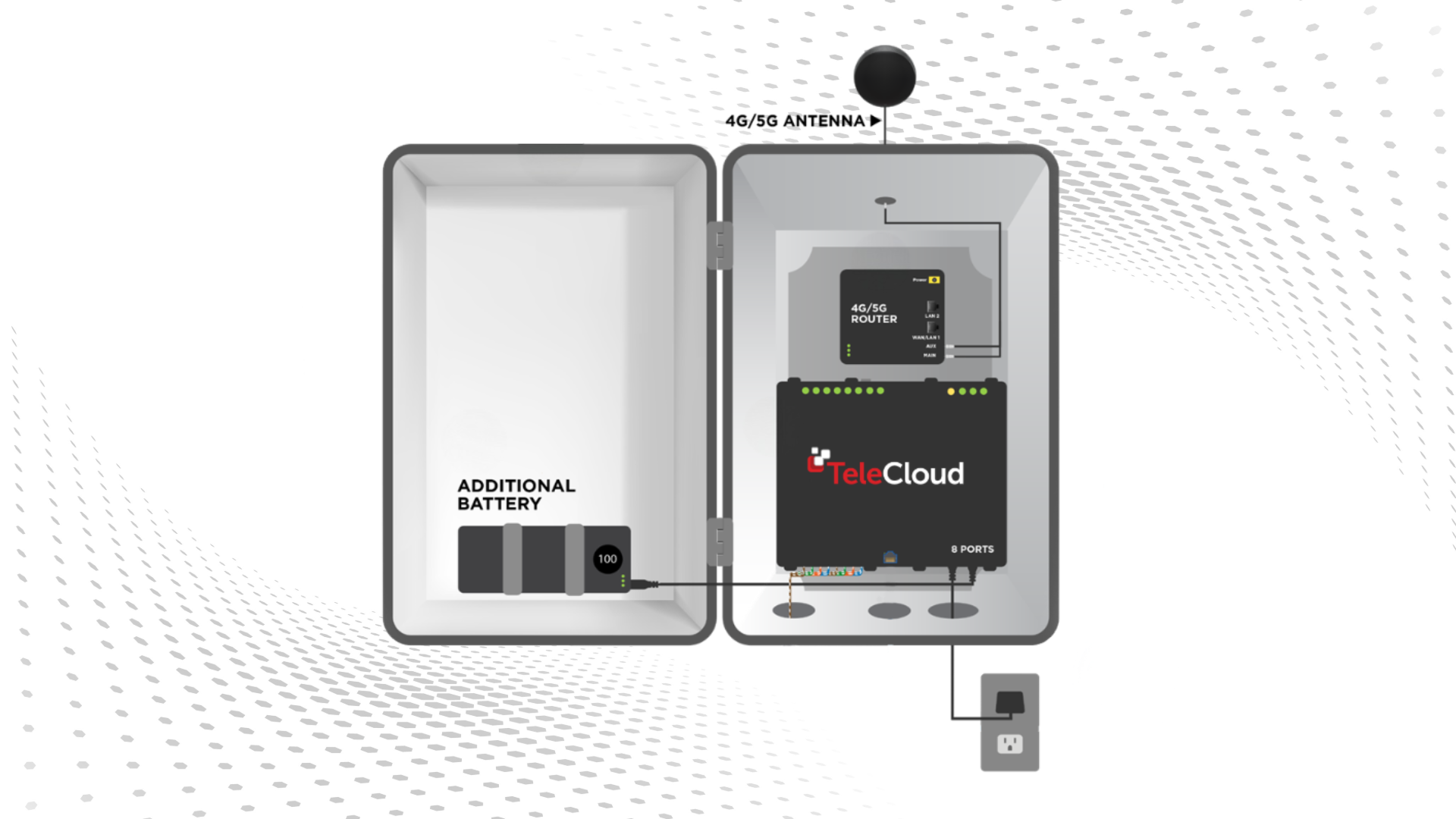Should You Rent or Buy Your VoIP Business Phones? (2025 Buyer’s Guide)
April 24th, 2025
4 min read
By Will Maddox

When upgrading your business communication systems, one question always comes up: “Should we rent or purchase our desk phones?”
At first, it feels like a straightforward cost comparison: monthly rental vs. one-time purchase. But in reality, this decision goes deeper. It affects your IT support burden, equipment lifecycle, flexibility for remote teams, and how ready your business will be for future innovations like AI-enhanced calling, call analytics, and integrated texting.
At TeleCloud, we’ve helped organizations of all sizes, from fast-growing startups to multi-site enterprises, roll out VoIP systems that actually fit how their teams work. We’ve seen the pros and cons of both renting and purchasing hardware, and the truth is: the best option depends on your goals, your growth plans, and how you view technology.
In this guide, we’ll break down what you need to know about renting vs. buying business phone hardware, so you can make the right call (pun fully intended).
What’s the Real Difference Between Renting and Buying Business Phones?
The biggest difference comes down to lifecycle and support. Do you want a one-time purchase with long-term ownership or a monthly model with hardware and service baked in?
Renting:
- Monthly payment for each phone (typically $3–$10/month per device)
- Hardware support and warranty fully included
- Easy replacement or upgrade when hardware becomes outdated
- No large upfront capital expense
Buying:
- One-time hardware purchase (typically $150–$300 per device)
- Warranty limited to 1 year (unless extended)
- Full ownership of hardware with depreciation over time
- Capital expenditure upfront, but no ongoing hardware payment
Now, let’s unpack what each approach actually means for your business over time.
What Are the Advantages of Renting Your Business Phones?
Many businesses prefer renting for the same reason they prefer software subscriptions: predictable monthly costs and built-in flexibility. Here’s why renting might make more sense for you:
1. You Want Evergreen Technology
When you rent, your hardware stays current. At the end of your term (typically 2–5 years), you can refresh your phones with the latest models. That means better compatibility with modern platforms, built-in Wi-Fi/Bluetooth, and support for new features like AI transcription or mobile-first experiences.
2. You Don’t Want to Pay Extra for Support
Hardware rentals typically include warranty coverage and on-site support. If a phone breaks or fails, it’s replaced. You don’t have to chase down part numbers or wait on hold with manufacturers.
3. You Prefer Operational vs. Capital Expenses
For many companies, renting falls under operating expenses (OpEx), which are fully deductible depending on how your business files taxes. Buying, on the other hand, is a capital expense (CapEx) that may depreciate over time. (Always check with your accountant.)
4. You Want to Simplify IT and Scaling
Renting makes sense if your team is growing or shifting. New hires? New location? Just request more phones. You’re never stuck with outdated inventory or scrambling to replace broken gear.
When Does Buying Your Phones Make More Sense?
If you’re looking for more long-term control and have a stable environment, buying may be the right fit.
1. You’re Cash-Healthy and Want to Own the Asset
Buying hardware allows you to avoid recurring rental payments. If you have the capital available and plan to use the same phones for 5+ years, this could save you money over time, especially if you don’t anticipate major team changes or expansion.
2. You Have Internal IT Support
If your team is equipped to handle hardware repairs, reboots, firmware updates, and user support, you may not need a bundled support plan. But without dedicated IT? Rental might save you a lot of headaches.
3. You’re OK with Aging Technology
Buying locks you into your current hardware. You’ll need to replace phones manually if they become obsolete, unsupported, or fail. Some organizations are fine with that tradeoff. Just make sure you plan for eventual replacements.
What’s Included (and Not Included) with Each Option?
|
Feature |
Renting |
Buying |
|
Upfront Cost |
Low (usually bundled into monthly service) |
High ($150–$300 per phone) |
|
Warranty |
Included for life of the term |
1-year manufacturer warranty (extended costs extra) |
|
Hardware Refresh |
Yes – included at end of term |
No – must repurchase hardware |
|
On-Site Support |
Included |
Requires a support agreement |
|
Tax Benefits |
Often 100% deductible OpEx |
CapEx, may depreciate over time |
|
Risk of Obsolescence |
None (evergreen) |
High (you own and manage it) |
Common Mistakes Businesses Make When Choosing
Mistake #1: Choosing based on price alone
Phones may look cheap online, but if they break or aren’t supported, you’ll lose more in downtime and hassle.
Mistake #2: Forgetting to plan for growth
Buy too few phones today, and you’ll end up with mismatched models down the road.
Mistake #3: Not checking the warranty
Most purchases come with a 1-year warranty. After that, you're on your own unless you buy a support agreement.
Mistake #4: Assuming all hardware is compatible
Many providers only support certain brands or models. Always confirm before buying.
What About Financing? A Hybrid Option
Some providers offer lease-to-own or financing plans. But tread carefully.
Pros:
- Low upfront cost
- Fixed payments
- You own hardware at the end
Cons:
- Support may not be included
- Tech may be outdated by the time you’re done paying
Our advice: If you're going to pay monthly, renting gives you more flexibility and peace of mind.
What We Recommend (and Why)
At TeleCloud, we typically recommend renting hardware for most businesses, especially if:
- You want future-proof technology
- You expect to grow or relocate
- You value simplicity and fast replacements
- You don’t want to deal with support tickets or out-of-warranty devices
However, if you have a small, static team with minimal tech needs and a dedicated IT manager, buying may work just fine. Just plan for replacements in 4–5 years, and consider adding a support agreement by year two.
We’re not here to tell you one path is better than the other, we’re here to help you find the path that actually fits how your team works.
The Best Phone System Is the One That Works for You
At the end of the day, your business phones are just tools, tools that help your team connect with customers, deliver service, and drive revenue.
Whether you rent or buy, the key is making sure your hardware matches your needs, your budget, and your long-term goals.
Need help deciding? We’ve helped thousands of businesses compare options, understand their real needs, and find a solution that works both now and in the future.
Let’s talk. No pressure, just helpful advice.
Commonly Asked Questions
Can I mix rented and purchased phones in the same setup?
Yes, many VoIP providers (including TeleCloud) support hybrid deployments. This can be helpful if you want to own phones for your main office but rent phones for temporary staff, satellite locations, or remote workers.
What happens if I cancel my service while renting phones?
If you're renting, the phones typically must be returned at the end of your service term. Some agreements may include early termination fees or prorated penalties. It’s important to understand your rental agreement's return and cancellation policy before signing.
Is renting more expensive in the long run?
Not always. While you’ll pay more over time compared to an upfront purchase, rentals include support, warranty, replacements, and upgrades. When you factor in the cost of failed hardware, support contracts, and tech obsolescence, renting often comes out ahead—especially for growing businesses.
What if I outgrow the phones I purchased?
If you buy phones that later don’t meet your needs—whether due to staff growth, remote work expansion, or platform changes—you’ll need to replace them at your own cost. This is where renting offers more flexibility: upgrades are usually built into your agreement.
Topics:














